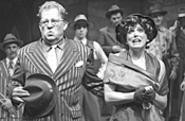Eventually, Runyon's characters found their way into one of the most treasured American musicals of all time, Guys and Dolls. It's a great piece, from the stilted, off-center argot of the tough guys, written by Jo Swerling and Abe Burrows to the witty lyrics of Frank Loesser, who also composed the tunes that are now so familiar -- "Luck Be a Lady," "I've Never Been in Love Before" -- they feel like part of our DNA.
With all that going for it, this show can fall flatter than a beat cop's arches if the production doesn't have an appreciation for its indelible characters. Happily, this is what the Porthouse Theatre company and artistic director Terri Kent do best; their attention to performance detail and unbridled adoration of this classic make for a glorious open-air evening of musical comedy.
The primary focus of the story is lead desperado Nathan Detroit (played by the gruffly likable Rohn Thomas), who is trying to set up a game of craps while also avoiding making a commitment to his fiancée of 14 years, the adenoidal Adelaide. The lead singer at the Hot Box nightclub, Adelaide just wants to settle down (she's already told her mother that she and Nathan are hitched and have five kids). In addition to her active fantasy life, Adelaide has many of the funniest songs -- including the sneezy and sniffly "Adelaide's Lament" -- and MaryAnn Black performs them with a perfect blend of innocent desire and street-tough spirit. Her comic timing is also spot-on: Regarding in-the-doghouse Nathan, she instructs, "Tell him I never want to talk to him again. And have him call me here."
The secondary love entanglement involves master gambler Sky Masterson ("He'd bet which cube of sugar a fly would land on"), who is out to win a wager with Nathan by sweeping Salvation Army missionary Sarah Brown off for a sultry evening in Havana. As Sky, Jim Weaver is lean and slick, purring his empty enticements into Sarah's ear even as she slowly pilfers his heart. Yolanda Christine Davis's Sarah is somewhat less successful, as her transitions from dialogue to song are a bit abrupt. Still, her drunk scene in a Cuban club, complete with the inebriated "If I Were a Bell," is a groggy charmer.
Almost as important as the leads are the gangsters who hang with Nathan and Sky, since they establish the tone and texture of the play, and Porthouse has a couple of gems. Eric van Baars gives Benny Southstreet a sly, glowering menace, and Andrew Cruse, as Harry the Horse, clad in a suit of awning pinstripes, is a hysterical compendium of tough-guy tics and twitches. The juicy role of Nicely-Nicely Johnson is handled well vocally by Timothy M.R. Culver -- the harmony in the "Fugue for Tinhorns," sung with van Baars and Andrew Tarr, is ideal -- but he is a bit soft in his characterization. Similarly, Chuck Richie looks more bloated than fearsome as the visiting villain Big Jule, his round and rosy-cheeked face perched atop an enormous fat suit.
Director Kent has perfect pitch when it comes to identifying the soul of a musical and, as she did last year with a fabulous production of Oklahoma, is able to distill the essence of Guys and Dolls into a potent nectar and give everyone in the audience a heady swig. She is aided immensely by Melissa Fucci's tight musical direction, Wendi R. Zea's incandescent costumes, and clever, character-appropriate choreography by John R. Crawford. The scenic design by Nolan O'Dell is well engineered, but is a bit too literal -- especially the main storefront flats -- to capture the overarching magic that is memorably evoked in the lyric "The streetlamp light fills the gutter with gold."
In act two, the show-stopper is the gospel-inspired "Sit Down, You're Rockin' the Boat," and as always, it was over too soon. Here's a vote for extending the length of this infectious tune until everyone in the place is singing along. Failing that, we can just wait for another production of Guys and Dolls as good as this one. It might be a while.


